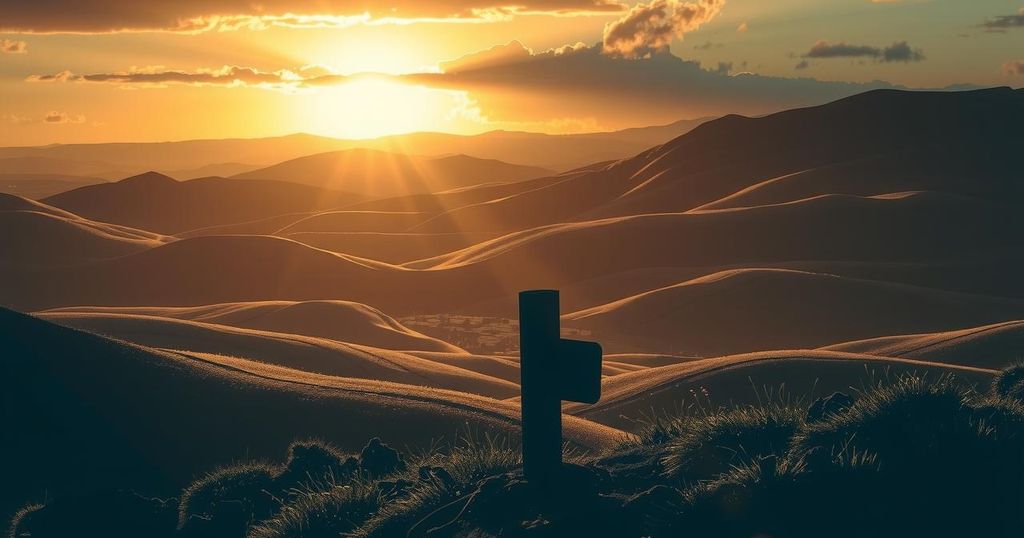M23 rebels have claimed control of Goma in eastern DRC, prompting fears of further conflict. The DRC government disputes this, yet reports indicate escalating violence and panic in the city. Humanitarian operations are severely impacted, and tens of thousands have fled. The situation is complicated by historical tensions and potential Rwandan involvement, raising the stakes in this already critical conflict.
The M23 rebel group has reportedly overtaken Goma, a crucial city in the eastern Democratic Republic of Congo (DRC), igniting fears of a broader conflict. The DRC government contested this claim, yet the match between government forces and M23 appears to indicate a rapid advancement by the rebels, with escalating tensions between the DRC and Rwanda, which is alleged to support M23. The M23 declared Goma’s liberation while the UN reported panic among the residents, and government officials described the uprising as a “declaration of war.”
Amidst the chaos, the M23 spokesperson assured citizens of Goma to remain calm, stating that the situation was under control after a swift assault on the city. After demanding surrender from DRC government soldiers and verifying some early capitulations, M23 now asserts control over key areas, including routes and the airport, essential for humanitarian efforts. The UN is evacuating non-essential staff amid reports of heavy artillery fire in central Goma and widespread power outages.
Despite governmental claims of controlling strategic parts of Goma, including the airport, the DRC military governor was killed near the city, revealing the dire situation. As alarming reports of artillery fire and prison escapes circulate, civilian residents report confusion and ongoing gunfire, illustrating the chaotic environment. Tens of thousands have fled Goma, adding to an already precarious humanitarian situation affecting the region.
The protracted conflict in eastern DRC is rooted in complex historical tensions over mineral resources and has lasted over three decades. The M23 group, primarily composed of ex-government soldiers from the Tutsi ethnicity, formed in 2012. Despite earlier setbacks, they have regrouped and challenged government authority, with many attributing their resurgence to Rwandan support despite official denials from Rwanda. The UN has highlighted Rwandan troop involvement, emphasizing potential escalation of violence.
Aside from the M23 conflict, the region is beset by a humanitarian crisis, exacerbated by the recent military activities of over 14,000 UN peacekeepers in the area. These forces, tasked with supporting the DRC military against M23, face direct hostilities and have reported casualties among their ranks, signifying the complexity and brutality of the ongoing conflict. The fallout from Goma’s potential loss could lead to wider regional turmoil.
This emerging crisis underscores the intricate interplay of local and regional dynamics, often resulting in increased displacements and humanitarian struggles. With Goma’s airport and major transportation routes inoperative, the ability to deliver aid is severely compromised. The rapid progression of M23 forces raises concerns over a potential larger conflict involving neighboring countries and the DRC itself.
The volatile situation in the eastern Democratic Republic of Congo (DRC) has its roots in decades of conflict fueled by control over mineral wealth and ethnic tensions. The M23 rebel group, established from former Congolese soldiers in 2012, has consistently challenged the authority of the DRC government, with intermittent support from neighboring Rwanda. The current situation has escalated significantly, presenting risks of widespread conflict and a deteriorating humanitarian crisis affecting millions.
The reported capture of Goma by the M23 rebel group symbolizes a critical turning point in the ongoing conflict in eastern DRC, potentially leading to greater regional instability. With humanitarian efforts hindered and fears of broader conflict looming, the situation necessitates urgent international attention and intervention to mitigate further escalation and alleviate the pressing humanitarian needs of the affected populations.
Original Source: www.twz.com






